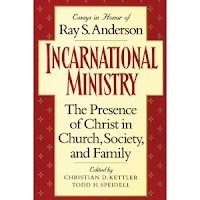Our part in God's ministry of atonement

The book Incarnational Ministry, the presence of Christ in Church, Society and Family contains an essay by Christian Kettler, The Atonement as the Life of God in the Ministry of the Church. Kettler notes that God's ministry ( his doing ) expresses his being as the God of love and grace. As we (the church) participate with God in his ministry, we learn more about his being. In this way, ministry precedes theology. However, the reverse is also true - our participation with God in his ministry grows as our understanding of his being (our theology) deepens. This dynamic interaction of ministry and theology is liberating, setting the church free to "determine its ministry based on who God is and what he has actually done, rather than what would sell in the marketplace of ideas and religions and in 'self-help' books" (p60). This being true, we ask, what is God's ministry ? The answer has many facets, but a primary one is that ...




